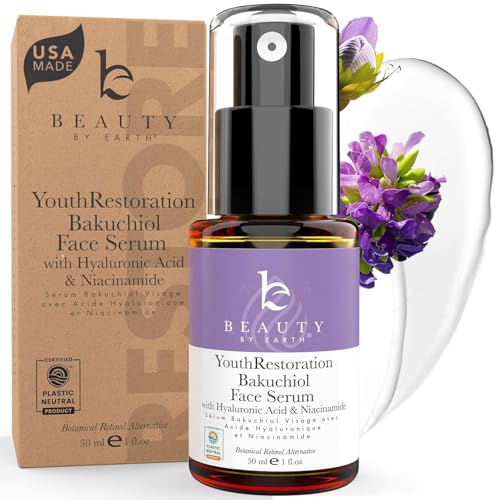
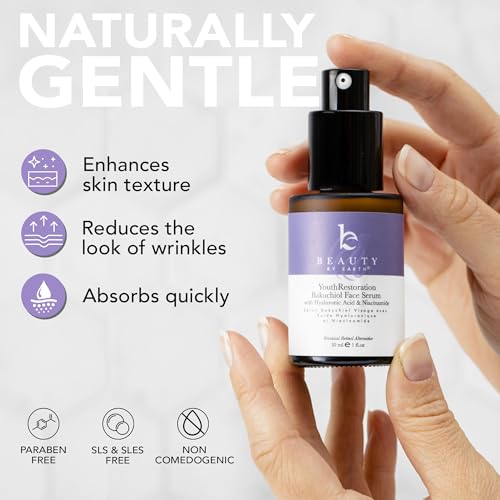
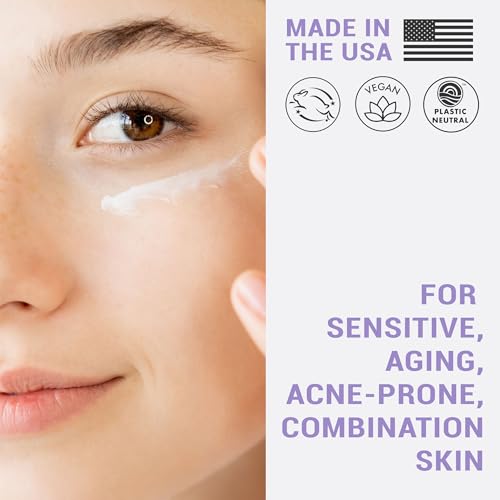
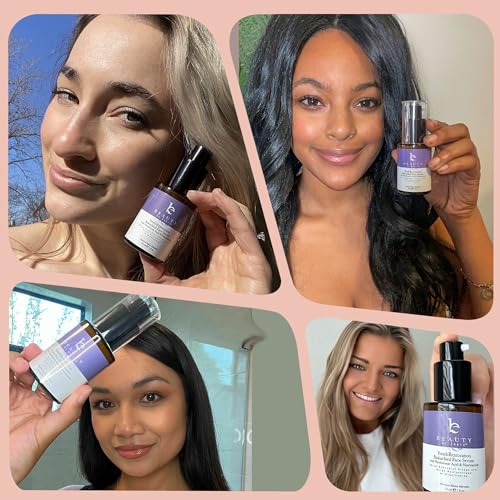
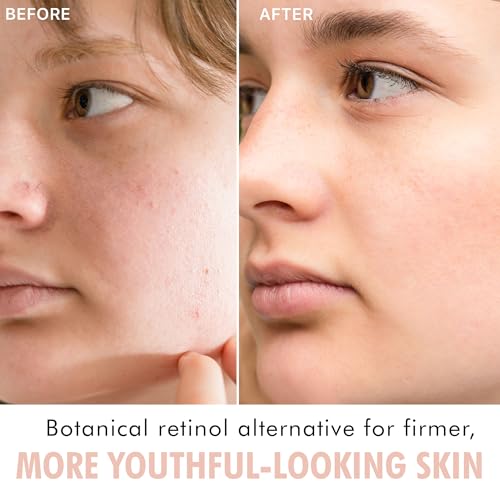
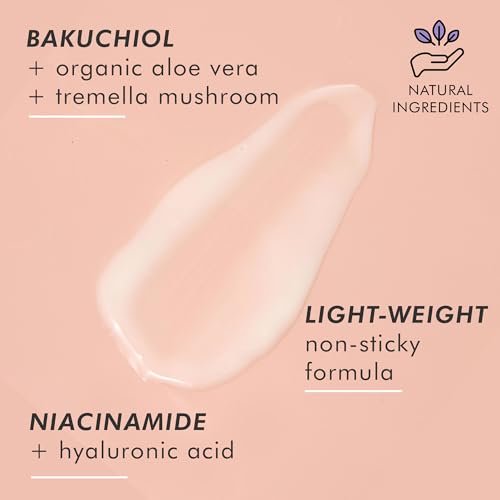
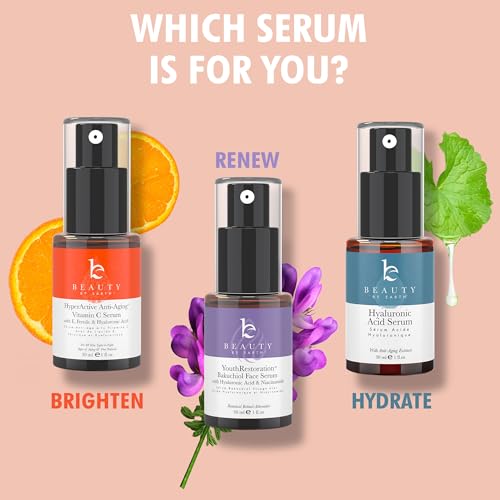
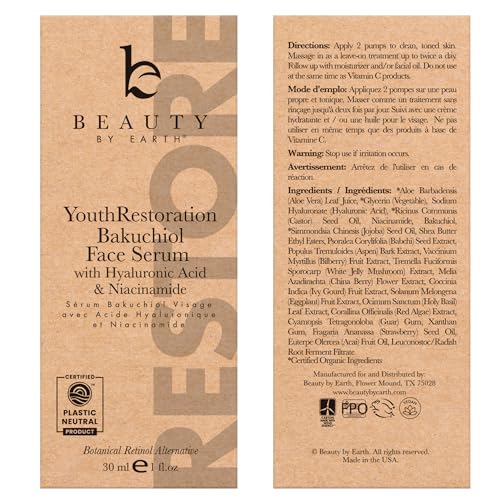
Bakuchiol Face Serum - Plant-Based Retinol Alternative, Reduces Fine Lines, 1.0 oz


Populus Tremuloides Bark Extract
High RiskPopulus tremuloides bark extract is an extract derived from the bark of the trembling aspen tree. It is primarily used in personal care products for its potential skin benefits, including soothing properties and moisture retention.
Sustai Insights
Populus tremuloides bark extract offers functional benefits such as enhanced skin absorption and moisturizing effects. However, it is associated with potential risks, including high use restrictions and concerns about skin irritation. Regulatory warnings indicate that its use is limited in certain applications. The overall risk assessment is high, and consumers should practice caution, consider alternatives, and adhere to usage recommendations to mitigate potential health impacts.
Ricinus Communis (Castor) Seed Oil
Medium RiskCastor oil is extracted from the seeds of Ricinus communis and is commonly used in cosmetic and personal care products for its moisturizing and emollient properties. It is known for its ability to enhance skin absorption and provide a protective barrier.
Sustai Insights
Castor oil offers functional benefits as a moisturizer and emollient, enhancing skin absorption and providing a barrier against moisture loss. It is sustainably sourced and biodegradable. However, potential health risks include low levels of irritation and moderate concerns regarding developmental and reproductive toxicity. Environmental risks are low, with no significant pollutant or bioaccumulation concerns reported. Regulatory status shows no current restrictions. Overall, the risk level is assessed as medium, with recommendations for safe usage practices, and potential alternatives include other plant-based oils.
Cyamopsis Tetragonoloba (Guar) Gum
Medium RiskCyamopsis tetragonoloba (guar) gum is a resinous substance derived from the seeds of the guar plant. It primarily functions as a thickening and stabilizing agent in various cosmetic and personal care products, enhancing texture and consistency.
Sustai Insights
Guar gum is valued for its thickening capabilities and is derived from a renewable source, contributing to its sustainability credentials. However, it poses moderate allergenic potential and low risks for carcinogenicity and reproductive toxicity. Environmental concerns are minimal, with no significant pollutant or bioaccumulation risks identified. Regulatory status is favorable, with no major restrictions noted. Users should practice caution with sensitive individuals, and alternatives like xanthan gum may serve as effective substitutes. Overall, the risk level associated with guar gum is assessed as medium, warranting careful consideration in product formulation.
Glycerin
Medium RiskGlycerin (also called glycerol) is a naturally occurring compound commonly used in personal care and cosmetic products. It functions as a humectant, attracting moisture to the skin, and is also utilized as a solvent and emollient to enhance product texture and stability.
Sustai Insights
Glycerin is valued for its effective moisturizing properties and biodegradability, making it a widely accepted ingredient in formulations. It poses low health risks, including low concerns for carcinogenicity and allergies. However, moderate use restrictions exist due to regulatory guidelines. While glycerin does not significantly contribute to environmental pollution, its production process should be ethically sourced. Overall, glycerin holds a medium risk level, emphasizing the importance of safe usage practices and considering sustainable alternatives.
Fragaria Ananassa (Strawberry) Seed Oil
Low RiskFragaria ananassa (strawberry) seed oil is derived from the seeds of strawberries and is primarily used in cosmetics for its emollient properties. It functions as a moisturizing agent, enhancing the skin's hydration and softness, while also providing a light texture in formulations.
Sustai Insights
Fragaria ananassa (strawberry) seed oil offers functional benefits such as moisturizing and skin conditioning. It is considered low risk regarding health effects, showing minimal concerns for carcinogenicity, allergies, or reproductive toxicity. Environmentally, it does not pose significant hazards. Regulatory assessments indicate no restrictions on its use. Overall, it is assessed as low risk, making it a suitable ingredient in cosmetic formulations.
Euterpe Oleracea Fruit Oil
Low RiskEuterpe oleracea fruit oil is a fruit-expressed oil derived from the acai palm tree. It is commonly used in cosmetic formulations for its moisturizing properties and as a source of antioxidants. The oil is known for its emollient qualities, enhancing skin hydration and texture in various personal care products.
Sustai Insights
Euterpe oleracea fruit oil offers functional benefits as a moisturizer and antioxidant, contributing to skin health. It is sustainably sourced and biodegradable, minimizing environmental impact. Health risks are low, with no significant concerns regarding carcinogenicity, allergies, or reproductive toxicity. Regulatory status indicates no restrictions, and overall risk assessment remains low. Safe usage is advised, particularly for sensitive populations, while alternatives include other plant-based oils like jojoba or argan oil for similar benefits.
Coccinia Indica Fruit Extract
Low RiskCoccinia indica fruit extract is an extract derived from the fruit of the Coccinia indica plant, commonly used in cosmetic and personal care products for its potential benefits in skin health and hydration.
Sustai Insights
Coccinia indica fruit extract is noted for its moisturizing and skin-soothing properties, which can enhance product efficacy. It is sustainably sourced and has low toxicity concerns, indicating minimal health risks such as carcinogenicity or allergies. Environmental impacts are also low, with no significant pollutant potential. Regulatory reviews show no restrictions on its use. Overall, the ingredient presents a low risk profile, making it a suitable choice in formulations.
Solanum Melongena (Eggplant) Fruit Extract
Low RiskSolanum melongena (eggplant) fruit extract is derived from the fruit of the eggplant plant, commonly used in cosmetic and personal care products for its antioxidant properties and skin-conditioning effects. It serves as a natural ingredient known for its potential to enhance product efficacy.
Sustai Insights
Solanum melongena (eggplant) fruit extract provides functional benefits such as antioxidant properties and skin conditioning, contributing positively to product formulations. It is sustainably sourced, presenting minimal environmental concerns. Health risks are low, with no significant adverse effects documented. Regulatory status shows no restrictions. Overall, the ingredient is assessed as low risk, making it a safe choice in cosmetic applications.
Hyaluronic Acid
Low RiskHyaluronic acid is a natural polysaccharide found in connective tissues, skin, and cartilage, primarily serving as a moisture-retaining agent in cosmetic products. Its primary function is to provide hydration and improve skin elasticity, making it a common ingredient in moisturizers and serums.
Sustai Insights
Hyaluronic acid offers significant functional benefits, such as effective hydration and skin plumping, while being biodegradable and generally recognized as safe by regulatory bodies. Health risks are minimal, with low concerns regarding carcinogenicity, allergies, or reproductive toxicity. Environmental risks are also low, as it is not considered a pollutant or bioaccumulative. Regulatory bodies have not issued major advisories against its use, resulting in an overall low-risk assessment. For safe usage, it is recommended to apply in appropriate concentrations. Alternatives include glycerin or aloe vera, which also provide hydration.
Niacinamide
Low RiskNiacinamide, also known as nicotinamide, is a form of vitamin B3 (niacin) that serves various functions in skincare and cosmetic products. It is often used for its potential benefits in improving skin texture, enhancing moisture retention, and supporting the skin's barrier function.
Sustai Insights
Niacinamide provides functional benefits such as enhancing skin hydration and improving the appearance of uneven skin tone. It is generally recognized as safe, with low concerns regarding carcinogenicity, allergies, or reproductive toxicity. However, enhanced skin absorption may pose risks for sensitive individuals. Regulatory bodies impose few restrictions on its use, and it is considered low risk overall. For safer alternatives, options like panthenol may be considered. Overall, niacinamide is a low-risk ingredient when used appropriately.
Tremella Fuciformis Sporocarp Extract
Low RiskTremella fuciformis sporocarp extract is derived from the Tremella fuciformis fungus, commonly known as snow mushroom. It is primarily used in cosmetic formulations for its hydrating properties and ability to enhance skin moisture retention. This extract is often included in products aimed at improving skin texture and appearance.
Sustai Insights
Tremella fuciformis sporocarp extract offers functional benefits such as effective hydration and skin conditioning, making it a popular choice in moisturizers. Its sustainability credentials include being biodegradable and sourced from renewable resources. Health risks are minimal, with low concerns regarding carcinogenicity, allergies, and reproductive toxicity. Environmental risks are also low, as it does not significantly contribute to pollution or bioaccumulation. Regulatory agencies do not impose restrictions on its use. Overall, the ingredient's risk level is considered low, with no major adverse effects reported, supporting its use in cosmetic applications.
Corallina Officinalis Extract
Low RiskCorallina officinalis extract is derived from a red algae species commonly found in marine environments. This extract is utilized in cosmetic formulations for its potential skin benefits, including hydration and antioxidant properties, contributing to the overall efficacy of the product.
Sustai Insights
Corallina officinalis extract serves as a skin-conditioning agent, promoting hydration and providing antioxidant benefits. It is considered low risk regarding health concerns, with minimal potential for carcinogenicity, allergenic reactions, or reproductive toxicity. Environmentally, it poses low risks as it does not significantly contribute to pollution or bioaccumulation. Regulatory assessments indicate no major restrictions on its use. Safe usage practices should be followed, and while alternatives exist, this ingredient presents a favorable profile overall, leading to a low risk assessment.
Vaccinium Myrtillus (Bilberry) Fruit Extract
Low RiskVaccinium myrtillus (bilberry) fruit extract is an extract derived from the fruit of the bilberry plant, known for its antioxidant properties. It is commonly used in cosmetic and skincare products for its potential benefits to skin health and appearance.
Sustai Insights
Vaccinium myrtillus fruit extract offers functional benefits as an antioxidant, potentially enhancing skin appearance and health. It is generally regarded as safe with low risks for carcinogenicity, allergenic reactions, and reproductive toxicity. Environmental concerns are minimal, as it poses low bioaccumulation risk. Regulatory bodies have not placed significant restrictions on its use, indicating a low overall risk profile. For safety, it is recommended to be used in typical cosmetic concentrations, with no known safer alternatives identified.
Bakuchiol
Low RiskBakuchiol is a naturally derived compound sourced from the seeds and leaves of the Psoralea corylifolia plant. It is primarily used in cosmetic formulations for its purported anti-aging properties, serving as an alternative to retinol in skincare products.
Sustai Insights
Bakuchiol offers functional benefits such as antioxidant properties and potential skin rejuvenation effects, and it is considered sustainably sourced. Health risks are low, with minimal concerns regarding carcinogenicity, allergies, or reproductive toxicity. Environmental risks are also low, and regulatory bodies have not issued significant warnings. Overall, it is assessed as a low-risk ingredient. Usage should follow product guidelines, and alternatives like retinol or other plant-based extracts may be considered.
Shea Butter Ethyl Esters
Low RiskShea butter ethyl esters are derived from shea butter and serve primarily as emollients in cosmetic formulations, enhancing the texture and moisturizing properties of products. They are often used in creams, lotions, and other personal care items for their ability to improve skin feel and hydration.
Sustai Insights
Shea butter ethyl esters provide effective moisturizing benefits, enhancing product texture while being sustainably sourced. Scientific assessments indicate low health risks, with minimal concerns regarding carcinogenicity, allergies, or reproductive toxicity. Environmentally, they are not classified as pollutants or bioaccumulative. Regulatory status is clear with no current restrictions, leading to an overall low-risk assessment. Safe usage is recommended in standard concentrations, and greener alternatives exist, though this ingredient remains a viable option.
Leuconostoc/Radish Root Ferment Filtrate
Low RiskLeuconostoc/radish root ferment filtrate is a natural fermentation product derived from radish roots, commonly used in skincare for its potential preservative properties and skin-conditioning benefits. It functions by harnessing the metabolic activity of Leuconostoc bacteria to provide a source of beneficial compounds.
Sustai Insights
This ingredient offers functional benefits, primarily as a preservative and skin-conditioning agent, while being biodegradable and sustainably sourced. Health risks are generally low, with no significant concerns regarding carcinogenicity or allergies, though contamination concerns exist. Environmentally, it poses minimal risks, categorized as low overall risk based on current scientific consensus. Safe usage practices are advised, and alternatives may include other natural preservatives like tocopherol or rosemary extract.
Azadirachta Indica Flower Extract
Low RiskAzadirachta indica flower extract, derived from the flowers of the Neem tree, is commonly used in cosmetics and personal care products for its potential soothing and anti-inflammatory properties. It serves as a botanical extract, contributing to the formulation's overall efficacy.
Sustai Insights
Azadirachta indica flower extract offers functional benefits such as soothing properties and potential antimicrobial effects, contributing positively to formulations. It is sustainably sourced and biodegradable. Health risks are considered low, with minimal concerns regarding carcinogenicity, allergies, or reproductive toxicity. Environmental impact is also low, with no significant bioaccumulation or pollution noted. Regulatory bodies have not imposed restrictions on its use. Overall, the ingredient presents a low risk profile, making it a favorable choice in product formulations.
Psoralea Corylifolia Seed Extract
Low RiskPsoralea corylifolia seed extract is derived from the seeds of the Psoralea corylifolia plant, commonly used in traditional medicine and cosmetics. It is known for its potential therapeutic properties and is often included in formulations for skin treatment, particularly for its antioxidant and anti-inflammatory effects.
Sustai Insights
Psoralea corylifolia seed extract offers functional benefits like antioxidant properties and skin treatment applications. Scientific assessments indicate low health risks, with no significant concerns for carcinogenicity, allergies, or reproductive toxicity. Environmentally, it poses minimal risk as a pollutant. Currently, it is not restricted by regulatory agencies, suggesting a low-risk level overall. Safe usage practices should be followed, and alternatives may include other botanical extracts with similar properties for enhanced sustainability.
Ocimum Sanctum Leaf Extract
Low RiskOcimum sanctum leaf extract is an extract derived from the leaves of the Ocimum sanctum plant, commonly known as holy basil. It is used in various products for its potential health benefits and functional properties, including its role as an antioxidant and its use in traditional medicine.
Sustai Insights
Ocimum sanctum leaf extract offers functional benefits such as antioxidant properties and potential support for immune health. It is generally recognized as safe, with low concerns regarding carcinogenicity, allergy, and reproductive toxicity. Environmental risks appear minimal, and it is not subject to significant regulatory restrictions. Overall, the ingredient is assessed to have a low risk level, making it a viable option in formulations. Users are encouraged to adhere to recommended usage levels, and alternatives are available if needed.
Xanthan Gum
Low RiskXanthan gum is a polysaccharide, a sugar-based compound produced by the fermentation of glucose or sucrose. It is commonly used as a thickening agent and stabilizer in various food and cosmetic products due to its ability to improve texture and prevent ingredient separation.
Sustai Insights
Xanthan gum serves effectively as a thickener and stabilizer, enhancing product texture and consistency. It is biodegradable and typically derived from renewable sources, supporting sustainability efforts. Health risks are minimal, with low concerns regarding carcinogenicity, allergies, and reproductive toxicity. Environmental impact is similarly low, posing no significant hazards. Regulatory agencies, including the FDA, regard it as safe for use, with no significant restrictions. Overall, xanthan gum is assessed as low risk, making it a suitable ingredient in formulations.
Simmondsia Chinensis (Jojoba) Seed Oil
Low RiskSimmondsia chinensis (jojoba) seed oil is extracted from the seeds of the jojoba plant. It is commonly used in cosmetics for its moisturizing properties and ability to mimic human sebum, making it beneficial for skin and hair care formulations.
Sustai Insights
Jojoba seed oil offers functional benefits such as effective moisturization and emollience, contributing to skin hydration and smoothness. It is sustainably sourced and biodegradable. Health risks are low, with minimal concerns regarding carcinogenicity, allergies, and reproductive toxicity. Environmental risks are also low, as it does not significantly contribute to pollution or bioaccumulation. Currently, there are no regulatory restrictions on its use. Overall, the risk level is low, and it is considered a safe ingredient with no significant adverse effects.
Aloe Barbadensis (Aloe Vera) Leaf Juice
Low RiskAloe barbadensis (aloe vera) leaf juice is derived from the succulent aloe vera plant, known for its hydrating and soothing properties. It is commonly used in cosmetic formulations for its moisturizing effects and is often included in products aimed at skin care and healing.
Sustai Insights
Aloe vera leaf juice offers functional benefits as a moisturizer and skin soothing agent, while being sustainably sourced and biodegradable. Health risks are low, with minimal concerns regarding carcinogenicity, allergies, and reproductive toxicity. Environmental impact is also low, with no significant pollutants identified. Regulatory agencies impose few restrictions. Overall, the ingredient poses a low risk, making it a favorable choice in cosmetic formulations.
Fragaria Ananassa (Strawberry) Seed Oil
Low RiskFragaria ananassa (strawberry) seed oil is derived from the seeds of strawberries and is primarily used in cosmetics for its emollient properties. It functions as a moisturizing agent, enhancing the skin's hydration and softness, while also providing a light texture in formulations.
Sustai Insights
Fragaria ananassa (strawberry) seed oil offers functional benefits such as moisturizing and skin conditioning. It is considered low risk regarding health effects, showing minimal concerns for carcinogenicity, allergies, or reproductive toxicity. Environmentally, it does not pose significant hazards. Regulatory assessments indicate no restrictions on its use. Overall, it is assessed as low risk, making it a suitable ingredient in cosmetic formulations.
Ricinus Communis (Castor) Seed Oil
Medium RiskCastor oil is extracted from the seeds of Ricinus communis and is commonly used in cosmetic and personal care products for its moisturizing and emollient properties. It is known for its ability to enhance skin absorption and provide a protective barrier.
Sustai Insights
Castor oil offers functional benefits as a moisturizer and emollient, enhancing skin absorption and providing a barrier against moisture loss. It is sustainably sourced and biodegradable. However, potential health risks include low levels of irritation and moderate concerns regarding developmental and reproductive toxicity. Environmental risks are low, with no significant pollutant or bioaccumulation concerns reported. Regulatory status shows no current restrictions. Overall, the risk level is assessed as medium, with recommendations for safe usage practices, and potential alternatives include other plant-based oils.
Euterpe Oleracea Fruit Oil
Low RiskEuterpe oleracea fruit oil is a fruit-expressed oil derived from the acai palm tree. It is commonly used in cosmetic formulations for its moisturizing properties and as a source of antioxidants. The oil is known for its emollient qualities, enhancing skin hydration and texture in various personal care products.
Sustai Insights
Euterpe oleracea fruit oil offers functional benefits as a moisturizer and antioxidant, contributing to skin health. It is sustainably sourced and biodegradable, minimizing environmental impact. Health risks are low, with no significant concerns regarding carcinogenicity, allergies, or reproductive toxicity. Regulatory status indicates no restrictions, and overall risk assessment remains low. Safe usage is advised, particularly for sensitive populations, while alternatives include other plant-based oils like jojoba or argan oil for similar benefits.
Coccinia Indica Fruit Extract
Low RiskCoccinia indica fruit extract is an extract derived from the fruit of the Coccinia indica plant, commonly used in cosmetic and personal care products for its potential benefits in skin health and hydration.
Sustai Insights
Coccinia indica fruit extract is noted for its moisturizing and skin-soothing properties, which can enhance product efficacy. It is sustainably sourced and has low toxicity concerns, indicating minimal health risks such as carcinogenicity or allergies. Environmental impacts are also low, with no significant pollutant potential. Regulatory reviews show no restrictions on its use. Overall, the ingredient presents a low risk profile, making it a suitable choice in formulations.
Solanum Melongena (Eggplant) Fruit Extract
Low RiskSolanum melongena (eggplant) fruit extract is derived from the fruit of the eggplant plant, commonly used in cosmetic and personal care products for its antioxidant properties and skin-conditioning effects. It serves as a natural ingredient known for its potential to enhance product efficacy.
Sustai Insights
Solanum melongena (eggplant) fruit extract provides functional benefits such as antioxidant properties and skin conditioning, contributing positively to product formulations. It is sustainably sourced, presenting minimal environmental concerns. Health risks are low, with no significant adverse effects documented. Regulatory status shows no restrictions. Overall, the ingredient is assessed as low risk, making it a safe choice in cosmetic applications.
Hyaluronic Acid
Low RiskHyaluronic acid is a natural polysaccharide found in connective tissues, skin, and cartilage, primarily serving as a moisture-retaining agent in cosmetic products. Its primary function is to provide hydration and improve skin elasticity, making it a common ingredient in moisturizers and serums.
Sustai Insights
Hyaluronic acid offers significant functional benefits, such as effective hydration and skin plumping, while being biodegradable and generally recognized as safe by regulatory bodies. Health risks are minimal, with low concerns regarding carcinogenicity, allergies, or reproductive toxicity. Environmental risks are also low, as it is not considered a pollutant or bioaccumulative. Regulatory bodies have not issued major advisories against its use, resulting in an overall low-risk assessment. For safe usage, it is recommended to apply in appropriate concentrations. Alternatives include glycerin or aloe vera, which also provide hydration.
Niacinamide
Low RiskNiacinamide, also known as nicotinamide, is a form of vitamin B3 (niacin) that serves various functions in skincare and cosmetic products. It is often used for its potential benefits in improving skin texture, enhancing moisture retention, and supporting the skin's barrier function.
Sustai Insights
Niacinamide provides functional benefits such as enhancing skin hydration and improving the appearance of uneven skin tone. It is generally recognized as safe, with low concerns regarding carcinogenicity, allergies, or reproductive toxicity. However, enhanced skin absorption may pose risks for sensitive individuals. Regulatory bodies impose few restrictions on its use, and it is considered low risk overall. For safer alternatives, options like panthenol may be considered. Overall, niacinamide is a low-risk ingredient when used appropriately.
Populus Tremuloides Bark Extract
High RiskPopulus tremuloides bark extract is an extract derived from the bark of the trembling aspen tree. It is primarily used in personal care products for its potential skin benefits, including soothing properties and moisture retention.
Sustai Insights
Populus tremuloides bark extract offers functional benefits such as enhanced skin absorption and moisturizing effects. However, it is associated with potential risks, including high use restrictions and concerns about skin irritation. Regulatory warnings indicate that its use is limited in certain applications. The overall risk assessment is high, and consumers should practice caution, consider alternatives, and adhere to usage recommendations to mitigate potential health impacts.
Tremella Fuciformis Sporocarp Extract
Low RiskTremella fuciformis sporocarp extract is derived from the Tremella fuciformis fungus, commonly known as snow mushroom. It is primarily used in cosmetic formulations for its hydrating properties and ability to enhance skin moisture retention. This extract is often included in products aimed at improving skin texture and appearance.
Sustai Insights
Tremella fuciformis sporocarp extract offers functional benefits such as effective hydration and skin conditioning, making it a popular choice in moisturizers. Its sustainability credentials include being biodegradable and sourced from renewable resources. Health risks are minimal, with low concerns regarding carcinogenicity, allergies, and reproductive toxicity. Environmental risks are also low, as it does not significantly contribute to pollution or bioaccumulation. Regulatory agencies do not impose restrictions on its use. Overall, the ingredient's risk level is considered low, with no major adverse effects reported, supporting its use in cosmetic applications.
Corallina Officinalis Extract
Low RiskCorallina officinalis extract is derived from a red algae species commonly found in marine environments. This extract is utilized in cosmetic formulations for its potential skin benefits, including hydration and antioxidant properties, contributing to the overall efficacy of the product.
Sustai Insights
Corallina officinalis extract serves as a skin-conditioning agent, promoting hydration and providing antioxidant benefits. It is considered low risk regarding health concerns, with minimal potential for carcinogenicity, allergenic reactions, or reproductive toxicity. Environmentally, it poses low risks as it does not significantly contribute to pollution or bioaccumulation. Regulatory assessments indicate no major restrictions on its use. Safe usage practices should be followed, and while alternatives exist, this ingredient presents a favorable profile overall, leading to a low risk assessment.
Vaccinium Myrtillus (Bilberry) Fruit Extract
Low RiskVaccinium myrtillus (bilberry) fruit extract is an extract derived from the fruit of the bilberry plant, known for its antioxidant properties. It is commonly used in cosmetic and skincare products for its potential benefits to skin health and appearance.
Sustai Insights
Vaccinium myrtillus fruit extract offers functional benefits as an antioxidant, potentially enhancing skin appearance and health. It is generally regarded as safe with low risks for carcinogenicity, allergenic reactions, and reproductive toxicity. Environmental concerns are minimal, as it poses low bioaccumulation risk. Regulatory bodies have not placed significant restrictions on its use, indicating a low overall risk profile. For safety, it is recommended to be used in typical cosmetic concentrations, with no known safer alternatives identified.
Bakuchiol
Low RiskBakuchiol is a naturally derived compound sourced from the seeds and leaves of the Psoralea corylifolia plant. It is primarily used in cosmetic formulations for its purported anti-aging properties, serving as an alternative to retinol in skincare products.
Sustai Insights
Bakuchiol offers functional benefits such as antioxidant properties and potential skin rejuvenation effects, and it is considered sustainably sourced. Health risks are low, with minimal concerns regarding carcinogenicity, allergies, or reproductive toxicity. Environmental risks are also low, and regulatory bodies have not issued significant warnings. Overall, it is assessed as a low-risk ingredient. Usage should follow product guidelines, and alternatives like retinol or other plant-based extracts may be considered.
Shea Butter Ethyl Esters
Low RiskShea butter ethyl esters are derived from shea butter and serve primarily as emollients in cosmetic formulations, enhancing the texture and moisturizing properties of products. They are often used in creams, lotions, and other personal care items for their ability to improve skin feel and hydration.
Sustai Insights
Shea butter ethyl esters provide effective moisturizing benefits, enhancing product texture while being sustainably sourced. Scientific assessments indicate low health risks, with minimal concerns regarding carcinogenicity, allergies, or reproductive toxicity. Environmentally, they are not classified as pollutants or bioaccumulative. Regulatory status is clear with no current restrictions, leading to an overall low-risk assessment. Safe usage is recommended in standard concentrations, and greener alternatives exist, though this ingredient remains a viable option.
Leuconostoc/Radish Root Ferment Filtrate
Low RiskLeuconostoc/radish root ferment filtrate is a natural fermentation product derived from radish roots, commonly used in skincare for its potential preservative properties and skin-conditioning benefits. It functions by harnessing the metabolic activity of Leuconostoc bacteria to provide a source of beneficial compounds.
Sustai Insights
This ingredient offers functional benefits, primarily as a preservative and skin-conditioning agent, while being biodegradable and sustainably sourced. Health risks are generally low, with no significant concerns regarding carcinogenicity or allergies, though contamination concerns exist. Environmentally, it poses minimal risks, categorized as low overall risk based on current scientific consensus. Safe usage practices are advised, and alternatives may include other natural preservatives like tocopherol or rosemary extract.
Cyamopsis Tetragonoloba (Guar) Gum
Medium RiskCyamopsis tetragonoloba (guar) gum is a resinous substance derived from the seeds of the guar plant. It primarily functions as a thickening and stabilizing agent in various cosmetic and personal care products, enhancing texture and consistency.
Sustai Insights
Guar gum is valued for its thickening capabilities and is derived from a renewable source, contributing to its sustainability credentials. However, it poses moderate allergenic potential and low risks for carcinogenicity and reproductive toxicity. Environmental concerns are minimal, with no significant pollutant or bioaccumulation risks identified. Regulatory status is favorable, with no major restrictions noted. Users should practice caution with sensitive individuals, and alternatives like xanthan gum may serve as effective substitutes. Overall, the risk level associated with guar gum is assessed as medium, warranting careful consideration in product formulation.
Azadirachta Indica Flower Extract
Low RiskAzadirachta indica flower extract, derived from the flowers of the Neem tree, is commonly used in cosmetics and personal care products for its potential soothing and anti-inflammatory properties. It serves as a botanical extract, contributing to the formulation's overall efficacy.
Sustai Insights
Azadirachta indica flower extract offers functional benefits such as soothing properties and potential antimicrobial effects, contributing positively to formulations. It is sustainably sourced and biodegradable. Health risks are considered low, with minimal concerns regarding carcinogenicity, allergies, or reproductive toxicity. Environmental impact is also low, with no significant bioaccumulation or pollution noted. Regulatory bodies have not imposed restrictions on its use. Overall, the ingredient presents a low risk profile, making it a favorable choice in product formulations.
Psoralea Corylifolia Seed Extract
Low RiskPsoralea corylifolia seed extract is derived from the seeds of the Psoralea corylifolia plant, commonly used in traditional medicine and cosmetics. It is known for its potential therapeutic properties and is often included in formulations for skin treatment, particularly for its antioxidant and anti-inflammatory effects.
Sustai Insights
Psoralea corylifolia seed extract offers functional benefits like antioxidant properties and skin treatment applications. Scientific assessments indicate low health risks, with no significant concerns for carcinogenicity, allergies, or reproductive toxicity. Environmentally, it poses minimal risk as a pollutant. Currently, it is not restricted by regulatory agencies, suggesting a low-risk level overall. Safe usage practices should be followed, and alternatives may include other botanical extracts with similar properties for enhanced sustainability.
Ocimum Sanctum Leaf Extract
Low RiskOcimum sanctum leaf extract is an extract derived from the leaves of the Ocimum sanctum plant, commonly known as holy basil. It is used in various products for its potential health benefits and functional properties, including its role as an antioxidant and its use in traditional medicine.
Sustai Insights
Ocimum sanctum leaf extract offers functional benefits such as antioxidant properties and potential support for immune health. It is generally recognized as safe, with low concerns regarding carcinogenicity, allergy, and reproductive toxicity. Environmental risks appear minimal, and it is not subject to significant regulatory restrictions. Overall, the ingredient is assessed to have a low risk level, making it a viable option in formulations. Users are encouraged to adhere to recommended usage levels, and alternatives are available if needed.
Glycerin
Medium RiskGlycerin (also called glycerol) is a naturally occurring compound commonly used in personal care and cosmetic products. It functions as a humectant, attracting moisture to the skin, and is also utilized as a solvent and emollient to enhance product texture and stability.
Sustai Insights
Glycerin is valued for its effective moisturizing properties and biodegradability, making it a widely accepted ingredient in formulations. It poses low health risks, including low concerns for carcinogenicity and allergies. However, moderate use restrictions exist due to regulatory guidelines. While glycerin does not significantly contribute to environmental pollution, its production process should be ethically sourced. Overall, glycerin holds a medium risk level, emphasizing the importance of safe usage practices and considering sustainable alternatives.
Xanthan Gum
Low RiskXanthan gum is a polysaccharide, a sugar-based compound produced by the fermentation of glucose or sucrose. It is commonly used as a thickening agent and stabilizer in various food and cosmetic products due to its ability to improve texture and prevent ingredient separation.
Sustai Insights
Xanthan gum serves effectively as a thickener and stabilizer, enhancing product texture and consistency. It is biodegradable and typically derived from renewable sources, supporting sustainability efforts. Health risks are minimal, with low concerns regarding carcinogenicity, allergies, and reproductive toxicity. Environmental impact is similarly low, posing no significant hazards. Regulatory agencies, including the FDA, regard it as safe for use, with no significant restrictions. Overall, xanthan gum is assessed as low risk, making it a suitable ingredient in formulations.
Simmondsia Chinensis (Jojoba) Seed Oil
Low RiskSimmondsia chinensis (jojoba) seed oil is extracted from the seeds of the jojoba plant. It is commonly used in cosmetics for its moisturizing properties and ability to mimic human sebum, making it beneficial for skin and hair care formulations.
Sustai Insights
Jojoba seed oil offers functional benefits such as effective moisturization and emollience, contributing to skin hydration and smoothness. It is sustainably sourced and biodegradable. Health risks are low, with minimal concerns regarding carcinogenicity, allergies, and reproductive toxicity. Environmental risks are also low, as it does not significantly contribute to pollution or bioaccumulation. Currently, there are no regulatory restrictions on its use. Overall, the risk level is low, and it is considered a safe ingredient with no significant adverse effects.
Aloe Barbadensis (Aloe Vera) Leaf Juice
Low RiskAloe barbadensis (aloe vera) leaf juice is derived from the succulent aloe vera plant, known for its hydrating and soothing properties. It is commonly used in cosmetic formulations for its moisturizing effects and is often included in products aimed at skin care and healing.
Sustai Insights
Aloe vera leaf juice offers functional benefits as a moisturizer and skin soothing agent, while being sustainably sourced and biodegradable. Health risks are low, with minimal concerns regarding carcinogenicity, allergies, and reproductive toxicity. Environmental impact is also low, with no significant pollutants identified. Regulatory agencies impose few restrictions. Overall, the ingredient poses a low risk, making it a favorable choice in cosmetic formulations.
Experience radiant, youthful skin with the Bakuchiol Face Serum, a natural alternative to traditional retinol, specially formulated for sensitive skin. Made in the USA with organic ingredients, this serum offers a gentle yet effective solution to fine lines and uneven skin tone.
- Natural Retinol Alternative: Bakuchiol provides all the anti-aging benefits of retinol without irritation, perfect for sensitive skin.
- Organic Formulation: Crafted with high-quality, clean ingredients, ensuring purity and safety for your skin.
- Youthful Glow: Regular use visibly reduces wrinkles and improves skin elasticity, revealing a smoother complexion.
- Brightens & Evens Skin Tone: Bakuchiol helps brighten skin and smooth texture, promoting a radiant, even complexion.
- Support Small Businesses: Your purchase supports a mission-driven small business committed to quality and customer satisfaction.
Subscribe & Save with Sustai
- Best Price Guarantee: Always enjoy the lowest prices on sustainable home essentials.
- No Surprises: We’ll notify you before shipping. No hidden fees, ever.
- You’re in Charge: Change, pause, or cancel your subscription anytime with ease.
- Eco-Friendly Deliveries: Our grouped shipments mean less packaging and lower emissions.
Join us on a sustainable journey. Special offers for a limited time! Prices and promotions may change.
Recommended Products
Experience radiant, youthful skin with the Bakuchiol Face Serum, a natural alternative to traditional retinol, specially formulated for sensitive skin. Made in the USA with organic ingredients, this serum offers a gentle yet effective solution to fine lines and uneven skin tone.
- Natural Retinol Alternative: Bakuchiol provides all the anti-aging benefits of retinol without irritation, perfect for sensitive skin.
- Organic Formulation: Crafted with high-quality, clean ingredients, ensuring purity and safety for your skin.
- Youthful Glow: Regular use visibly reduces wrinkles and improves skin elasticity, revealing a smoother complexion.
- Brightens & Evens Skin Tone: Bakuchiol helps brighten skin and smooth texture, promoting a radiant, even complexion.
- Support Small Businesses: Your purchase supports a mission-driven small business committed to quality and customer satisfaction.

You can have at most 2 Sustainable Steals products in your cart
Customer Reviews
Customers’ View
Customers appreciate the effectiveness and eco-friendly nature of the Beauty by Earth Bakuchiol Face Serum. Many highlight its moisturizing properties, noting how easily it absorbs into the skin and enhances hydration levels. Users report a notable brightening effect, with improved skin texture and a reduction in dark spots, leading to a more even complexion. Additionally, the serum's clean and natural ingredients, including organic and vegan components, resonate well with health-conscious consumers. While most enjoy the pleasant scent, a few find it a bit strong. Overall, customers find this product effective and aligned with their sustainable lifestyle.
AI-generated from the text of customer reviewsThis product is rated 4.5 of 5.0 stars.
It has received 6 reviews.




